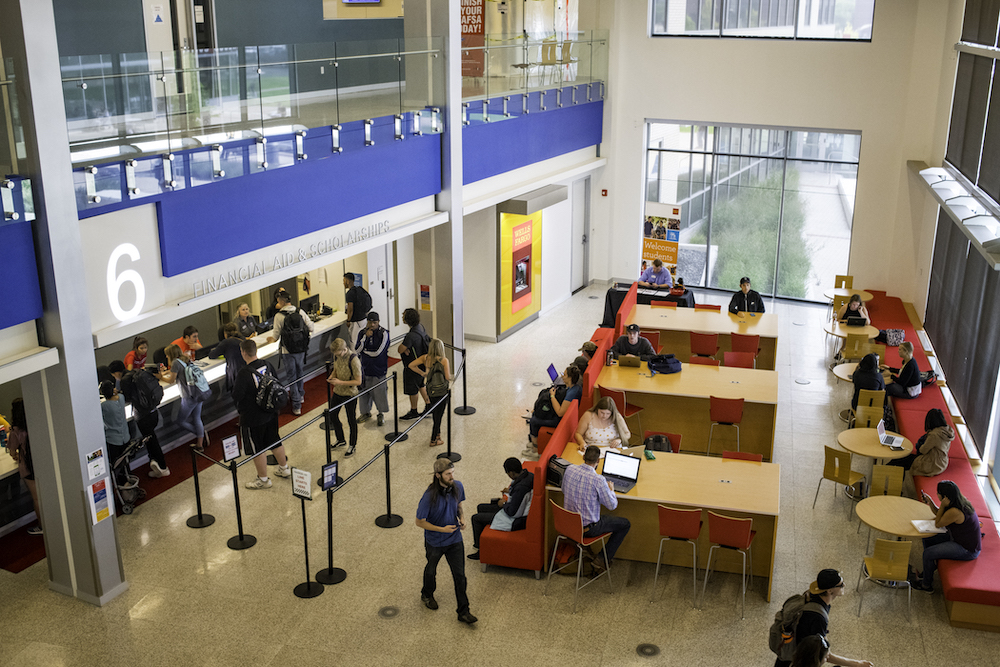

Friday’s Budget Recommendation Committee meeting focused on enrollment, tuition and student fees as well as updates on revenues, requests and compensation.
Summer enrollment update
Summer registration fully opened on March 9, and courses begin June 13. At the time of the presentation, state-funded, full-time-equivalent undergraduate enrollment was 8.6% down compared to summer 2021. Graduate enrollment was also down 7.58% for the same period.
Summer 2022 admissions pipeline data
Applications are up 0.13% (total 1,507 applicants) compared to summer 2021
- High school applications are down 2.45%
- Transfer applicants are down 4.26%
- Readmit applications are up 5.81%
Admitted is down 0.08% (total 1,232 admits) compared to summer 2021
- High school applications are up 4.98%
- Transfer applicants are down 5.68%
- Readmit applications are up 11.43%
Registered is down 33.14% (total yield is 115) compared to summer 2021
- High school applications are down 64.29%
- Transfer applicants are down 33.33%
- Readmit applications are flat
Graduate student applications
- Applications are up 1.73%
- Readmit applications are up 17.31%
- Registered students are down 8.33%
Additionally, data shows that summer enrollment is down 3.5% among students of color and down 12% among white students . The University’s goal is to keep enrollment flat and to improve the new student enrollment funnel, including better communication and improved, tailored orientation experiences.
Revenue scenarios
Colorado’s Joint Budget Committee has made its final recommendations, which included increasing higher education funding by nearly $130 million. MSU Denver would potentially receive an increase of $10.2 million, a roughly 14% increase in state funding. However, enrollment (tuition and fees) remains the University’s biggest source of revenue.
The University is recommending a 5% increase to mandatory fees to offset enrollment declines, inflation and compensation increases. This will help cover items including a mandatory 3% compensation increase for classified staff and possible staff salary increases as well as projected enrollment declines for fall 2022 and spring 2023. The state has also recommended a 2% tuition rate increase for institutions. A full-time, resident student would see a tuition and fees increase by $255 for the year; while full-time, non-resident students would see an increase of $605.
The University is also investing in outreach strategies and interventions that will help Roadrunners stay the course to graduation.
Compensation Subcommittee update
Members have been seeking employee feedback on compensation increases, finding that employees are most concerned about inflation and cost of living, salary compression and employee retention. Members considered whether or not these concerns may warrant different approaches to compensation increases for faculty vs. staff members, given the differences between the two compensation structures.
The committee found that faculty groups largely felt a percentage increase would be more beneficial, while more staff members supported a flat increase. Additional data and discussion are required, and members will continue to meet Thursdays to prepare several compensation recommendations/scenarios.
Phase I Budget: Branch Requests and Revenue Scenarios
George Middlemist, Ph.D., presented three tuition revenue scenarios based on optimistic, baseline and pessimistic enrollment projections, noting that each 1% change in enrollment equals roughly $1 million in revenue gained or lost.
In reviewing mandatory budget requests, Middlemist highlighted the two most significant base increases: faculty promotions and post-tenure reviews, totaling approximately $842,000, and AHEC/Auraria Library, totaling nearly $699,000. Other mandatory costs include nearly $193,000 for classified staff compensation, and areas such as computer leasing, institutional financial aid and risk management.
Base requests, excluding mandatory budget items, totaled nearly $16 million, including requests for 77 new FTEs. One-time requests total just over $12.6 million, for a total budget request of $31.9 million.
Across-the-board compensation increases were estimated based on low, mid and high increase scenarios and totaled between $576,000 to $4.2 million. All scenarios included maintaining CUPA for Category I faculty members.
The BRC meets next on April 1. Stay tuned to the Early Bird for meeting recaps.


